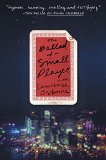Summary | Excerpt | Reviews | Beyond the Book | Readalikes | Genres & Themes | Author Bio

O n e
At midnight on Mondays, or a little after, I arrive at the Greek Mythology in Taipa, where I play on those nights when I have nowhere else to go, when I am tired of Fernando's and the Clube Militar and the little brothel hotels on Repubblica. I like it there because there are no Chinese TV stars and because they know me by sight. It is one of the older casinos, archaic and run-down. Its woodwork reeks of smoke, and its carpets have a sweet rancid sponginess that my English shoes like. I go there every other weekend night or so, losing a thousand a week from my Inexhaustible Fund. I go there to scatter my yuan, my dollars, my kwai, and losing there is easier than winning, more gratifying. It's more like winning than winning itself, and everyone knows you are not a real player until you secretly prefer losing.
I like the bars stocked with Great Wall and Dragon Seal wine, which you can mix with Dr Pepper. I like the Greeks themselves. Zeus at the top of the gold staircase and the friezes of centaurs. I like the receptionists in cherry hats who sleep with you if you pay them enough. I even like the deserted traffic circle at the end of the street where I can go to catch my breath during a losing streak. The air in Macau is always sharp and clean, somehow, except when it's foul and humid. We are surrounded by stormy seas.
The crowd is mainlander at New Year: an outpouring of the nearby cities of Guangzhou and Shenzen and their choking suburbs. They look like crows, like swarms of birds. I wonder what they make of the murals of happy nymphs. Among them one can spot the safety-pin millionaires, the managers of the Pearl River factories, the mom-and- pop owners of manufacturing units specializing in computer keyboard buttons and toy cogs and gears for lawn mowers. All here to blow their hard-earned wads on the I Ching. The doors are of that bright gold that the Chinese love, the carpets that deep red that they also love and that is said to be the color of Luck. Droplet chandeliers plunge from ceilings painted with scenes from Tiepolo, with the zephyrs given Asian canthi. Corridor flowing into corridor, an endless system of corridors, like every Macau casino.
I pass into a vestibule. Red vases, where the glass screens are frosted with images of Confucius and naked girls. In a private room, briefly glimpsed, two Chinese players are laying down $100 HK bets every minute, but with a show of macho lethargy and indifference. One of them smokes an enormous cigar from the open box of complimentary Havanas on the table, flicking the ash into a metal conch shell intended to echo the cheap reproductions of Botticelli cut into the blue walls. My hands begin to sweat beneath the gloves I always wear inside the gaming houses. The smell that curls into my nose is that of humans concentrating on their bad luck, perspiring like me because of the broken fans.
The game here is punto banco baccarat. It involves no skill, and that is why the Chinese like it. Each table has a vertical electronic board upon which the patterns of Luck are displayed as mathematical trends in columns of numerals. The crowds gather around these boards to decide which tables are lucky and which are not. They scrutinize the lines of numbers, which change minutely with every hand that is played at the table. It is a way of computing the winds of change, the patterns of Luck, and I daresay the Western eye cannot read them at all. But then, they are not intended for our eyes.
I sit and take out my crocodile wallet. I play in yellow kid gloves and everyone there thinks I am a lord of some kind, a lord on the run with a unlucky streak that can be mitigated by the forces of the I Ching. The waiter asks me if I would like another drink, a bottle of champagne, perhaps? I order a bottle of something or other and I think, I'll drink it all anyway, sooner or later, I always do. I never seem to get drunk either way. There is a middle-aged woman at the table and no one else. She looks over her spectacles toward me and there is the usual xenophobic hatred in her eye, and yet she is coquettish, she is a pro at the tables, she is dolled up in clothes from the malls in Tsim Sha Shui. She is playing with a mixture of mainland kwai
Excerpted from The Ballad of a Small Player by Lawrence Osborne. Copyright © 2014 by Lawrence Osborne. Excerpted by permission of Hogarth Books. All rights reserved. No part of this excerpt may be reproduced or reprinted without permission in writing from the publisher.
Your guide toexceptional books
BookBrowse seeks out and recommends the best in contemporary fiction and nonfiction—books that not only engage and entertain but also deepen our understanding of ourselves and the world around us.